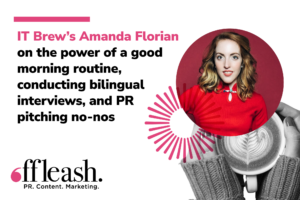IT Brew’s Amanda Florian on the power of a good morning routine, conducting bilingual interviews, and PR pitching no-nos

If you’re in tech and love reading the news, you’ve likely come across an article by Amanda Florian. Recently joining the IT Brew team as a reporter, she covers trending topics like cybersecurity, hackers, data breaches, AI, and more.
I recently sat down with Amanda to discuss her journalism career, how she likes working with PR people, and how she sees reporter roles changing with AI.
How do you typically kick off your workday to ensure a productive start?
I’m a huge fan of a good morning routine. As much as I love surprises and spontaneity, there’s already so much of that in the journalism industry, and I also really enjoy structure. I typically start the day by making my bed, making some coffee—usually Puerto Rican or Cuban coffee, something strong to keep me alert and focused, and then I’ll take some time to pray, journal, and mentally prepare for the day. Sometimes I’ll throw in a quick workout before sitting down to sift through news and social media posts while also turning on CNN in the background.
What is the most challenging part of your job? How do you navigate and overcome these challenges to deliver impactful stories?
That’s a good question. I think the most challenging part is probably letting stories be. I’m a perfectionist and someone who genuinely wants to pursue authenticity, transparency, and the truth. As a journalist, I want to make sure every single detail is fact-checked and accounted for—that my sources also feel protected, and that my reporting is fair and balanced. When delivering and working on impactful stories—yes, you’re going to have good days and bad days, and you’re going to have moments where you think, ‘Oh maybe I should have taken this other approach here.’ It’s part of the human experience and I think also part of a deep desire to be intentional and craft stories with care.
Can you share an aspect of your work that people might find surprising or unexpected?
People are always surprised to find out I’m also a singer, which is something my sisters and I have been doing since we were toddlers. On the journalism side, I’ve been freelancing since 2017. I’ve done everything from scriptwriting and feature stories to teaching voice lessons and live performances. I think many people expect journalists—and anyone in media—to fit into a box. As a half-Puerto Rican journalist who has lived in China; who speaks multiple languages and also has this creative, artsy side, I definitely do not fit into the stereotypical journalism box, and I embrace that.
How can a PR professional be most helpful to your reporting? Similarly, what will immediately turn you off from working with someone?
It’s always helpful when PR professionals suggest sources that are relevant! I’ve had some great experiences with PR teams who do this well—and then I’ve also had some poor experiences with reps who resort to insults or snarky comments because they’re trying to undermine my reporting or steer me away from a story—which is not effective or productive.
Another turn-off for me is when I send out a source request and then I get random pitches that have nothing to do with my beats or with the story at hand.
Can you share a memorable experience or story that stands out as your favorite? What makes it special to you?
One of my favorites was this freelance piece I recently worked on for the New York Times—with the interview taking place in both Spanish and English. Wow, what an experience. There was so much laughter and joy in that interview, and I think journalists always long for these types of interviews where you really feel like you’re able to connect with your sources on a human level—where you see them cry, and you see them laugh, and you get this very authentic and pure picture of who they are.
With the evolving landscape of media, how do you see the role of reporters changing, and how have you adapted to these changes?
As a tech reporter who isn’t overly pessimistic about the AI scene, I could honestly see AI becoming a good tool—if used properly—for aggregated content and quick news hits, but I also think the role of reporters may change in that viewers or readers may want to see more on-the-ground reporting and deep-dive reporting, so we could see more reporters leaning toward those kinds of stories. In grad school, my qualitative research centered on TikTok use during the pandemic, and I think TikTok and similar apps are a huge part of this conversation. Most audiences aren’t going to print or news channels first anymore, and that’s why journalists need to adapt. I think many of us realize the importance of utilizing and trying out new media apps. It doesn’t mean these new media apps will remain timeless, but I think as a journalist, you have to be willing to evolve and go where the people are.
If you could interview anyone, living or historical, who would it be and why?
I’d probably say Celine Dion, but I have so many others I’d love to chat with, including some of my inspirations like Clarissa Ward and G.E.M. (邓紫棋). I was introduced to Celine Dion’s music at a very early age, and she’s one of my all-time favorite artists for the way she utilizes her voice—her instrument—to tell a powerful story.